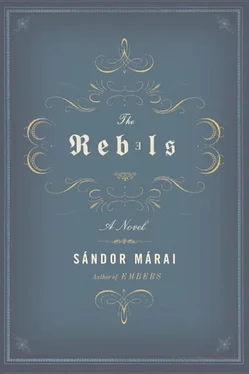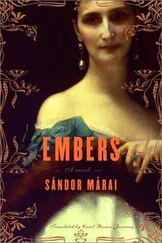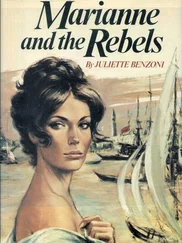His stage name was Amadé: Amadé Volpay was how they billed him. He spoke with his mouth full as if chewing on a dumpling. He wore generously fitting, light suits that skillfully disguised his fatness as did his corset that was laced so tightly when he was on stage that his face was practically red, so that he didn’t look half as fat as he did in life. It was as if his girth were no more than some kind of misapprehension that existed between him and the world at large, and he never ceased talking about it. He spoke eloquently and at length to both intimates and strangers in the effort to persuade them that he was not fat. He produced precise measurements and medical tables showing average proportions to prove he was as slender as a flamingo and that his figure was in all respects the manly ideal, his belly swelling as he did so because, in his passion, he forgot to hold it in.
Bearing this in mind he would walk down the street like a ballet dancer, practically mincing. He propelled his substantial body along on points, with delicate, genuinely airy steps, as if it weighed nothing, as if he feared being blown away by the next gust of wind. He always shaved his jowls to the same dazzling pale blue sheen. He would then apply powders and creams to them, and arrange them carefully in the space allowed by his folded-over collar as if they were a discrete and separate part of his body. Occasionally he would touch them tenderly with his short, pudgy, remarkably pale fingers to check that nothing was awry, that everything was where it ought to be.
The actor spent all day on the street, on the most frequented stretch of the high street, between the church and the café, from which he could keep an eye on the side entrance to the theater. You could see him there at all hours, patrolling up and down, usually holding forth and surrounded by a gaggle of people. It was only after supper that he retreated to the middle picture window of the café where anyone passing was obliged to acknowledge his presence and from which position he, in his turn, could keep track of everyone. He didn’t play cards. He didn’t drink. He appeared to avoid his fellow actors. His clothes carried the sweet but choking smell of cinnamon. It was this smell that emanated from him to the outside so that anyone passing him would know that Amadé Volpay was around.
He wore two rings on his fleshy fingers, one signet ring with a red stone and a wedding ring. He never denied that he was Jewish and unmarried. The rings were only for show.
THE GANG HAD ALREADY FORMED BY THE TIMEthe actor first appeared in town. There is in the development of every human association a period of jelling, a process of crystallization of whose laws we remain ignorant. They had in fact been in the same class since fourth grade. Ernõ was the only one who had spent eight full years at the institute. Béla, the grocer’s son, had shuttled between three schools before arriving there; he was a whole year at a school in the capital. He had been educated at boarding establishments, in places where there were thirty boys to a dormitory. Even in childhood he had worn a sword with his house uniform, a ceremonial smallsword to be precise. Tibor arrived in the fourth grade when the colonel was posted to the town. Ábel entered the school in the third grade having been taught at home before that.
There had been fifty of them in the fourth grade. Only seventeen remained to graduate. The war, of which they never spoke, silently took its toll of their numbers, secretly, half-unnoticed, as it tends to do in such remote nooks of life, even in a grade at the middle school of a provincial town. When war broke out they were entering fifth grade and there were still fifty of them. Now, four years later, only seventeen remained to graduate. Many of them simply failed to reappear. The peasant boys went home to take their fathers’ places. Many couldn’t afford the school fees. Many more just failed to attend without telling anyone why. Perhaps they were sick. Perhaps they had died. Many did indeed die, and their bodies were borne out with flags of mourning and wailing choirs. About a million had died on the front in those years, it was said. Or was it two million? There were even some who claimed three million. But they lived their obscure and remote lives behind the lines, among the mountains, the town wrapped in silence as in cotton wool. The war filtered through to them down channels no wider than a hair’s breadth. These hairbreadths sucked the life from the town as if driven by an invisible vast pump that replaced it with the stench of war, a peculiar, pestilent gas that arrived directly from the front, diluted a little, thinned out, but percolated through with enough strength to stiffen limbs, to fry lungs, and to destroy the weak. You couldn’t positively say this or that student was a victim of the war. But when the war broke out there were fifty of them and by the time they posed for the class photograph there were seventeen.
For two years, until seventh grade, the members of the gang took no notice of each other. They lived separate lives in close proximity to each other. Tibor gave himself over to his passion for sport. Ábel devoted himself to literature. Ernõ was wholly absorbed by his studies. It is very hard to say what brought them together, especially at this rather early age when there are no mutual concerns that help to develop friendship. You couldn’t say that the members of the gang ever liked each other. Not even that they felt any common sympathy. Béla sat at the back of the class and was, for some years, one of the low achievers, and had hardly exchanged a word with Ábel or with Tibor. Ábel did occasionally spend time with Ernõ but was always dismissed on a minor trifle, some hardly registered, unspoken rebuff that for a long time separated him from the cobbler’s boy. Generally it is not mutual feeling that unites people. On the contrary, people usually find the process of being thrown together painful and embarrassing. It is not a particularly amusing experience for two people to find themselves in company.
For three years Ábel sat in the middle of the third row from the door. Ernõ was stationed behind him, Tibor to his right in the front row. That’s how they spent three years. One day at the beginning of the fourth year Ábel was staring blankly ahead, bored with physics, slowly surveying the rows of other desks when his gaze settled on Tibor who had his head in his hands oblivious to everything, absorbed, reading a book under the table. It wasn’t that Ábel was particularly taken by the sight, nor was he the subject of some miraculous instantaneous illumination. Indeed, his first response was indifference and he decided to shift his attention elsewhere. But what he found, astonishingly, was that he couldn’t look away for long. His eyes wandered over the room, aware of the sleepy hum of fat autumnal bluebottles trailing their gross little bodies over the window. He couldn’t look away. Once he had convinced himself that it was Tibor’s head that was demanding his attention, he turned round to regard him with renewed interest. Was there something about Tibor he had failed to notice before? Maybe he had combed his hair a little differently today or was wearing a strange new tie. Ábel examined him carefully. He couldn’t see anything particularly different. Tibor’s hair was cropped short in military fashion. He was wearing a khaki-colored outfit and a green bow-tie. His fingers were automatically soothing his brow. He kept reading. At one point he put a finger to his nose, picked something, and rubbed it between his fingers absently while turning the pages with his other hand under the desk. For all Ábel could see he was fully absorbed in his book. He was probably reading the sports annual. Something about horses or football. Ábel watched him, trying to understand what it was that was so fascinating about him. He considered Tibor’s ears. They were small and pointed, close to his head. The fingers with which he was stroking his brow were bent like hooks yet the hand itself was soft and round. Ábel looked at his nose, Tibor’s face in quarter profile. The face had clear angular lines. He was the softer mirror image of Colonel Prockauer, only some thirty years younger and a touch freckled. Ábel gazed at him thoughtfully, and frowned. Later it would seem as if everything he had previously known about Tibor was brought into focus in these few seconds. For instance he knew that he had freckles on his neck as well as his face: they were there where his blond hair made a narrow arch above the topmost vertebra. The marks looked as if flies had dirtied that very pale skin of his.
Читать дальше












